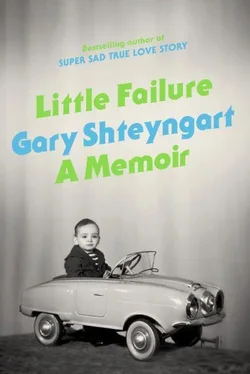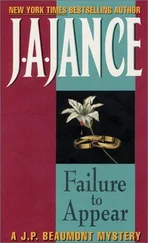I do not have a problem with alcohol or narcotics.
I am a bad son.
I am a bad son.
I am a bad son.

There is usually a lag between understanding and action. But I move quickly.
I break up with Pamela Sanders, taking myself out of the path of her wrath and her hammer. At first, I offer her the choice of ending her relationship with Kevin. She tells me that she feels like Kevin and I are both pointing guns at her head. *Yes, I want to tell her, but only my gun is cocked and loaded.
New Year’s Eve 2000 is coming up and she has not been invited to any parties. “What are you doing around New Year’s? Parties?” she asks me with a new shyness. I email her, telling her I have plans, typing the words reluctantly, because I know what it’s like to be lonely on an important date and because I still love her. She buys me a much belated birthday gift, a book.
Its title is St. Petersburg: Architecture of the Tsars .
Several months after I begin analysis, I do something I’ve been scared to do since I canceled my junior year abroad in Moscow. Despite my mother’s insistence that I will be killed and eaten right in front of the Hermitage, I buy a ticket back to St. Petersburg, Russia. And so, beneath my sweaty polyester ski hat, I am standing in front of the Chesme Church, its “sugarcoated spires and crenellations,” trying not to pass out. I still don’t understand the why of it, but at least I am here. At least I am trying.
Half a year into analysis, I apply to creative writing programs. Not to Iowa, because the pain of that rejection still blinds me, but to five others. I am accepted by all of them. The most promising one appears to be Cornell, which in addition to covering tuition and fees also gives a healthy stipend of twelve thousand dollars per year.
I happily call my parents to tell them that I’ve been accepted to an Ivy League school not focused on hotel administration. But, as a lark, I have also applied to Hunter College’s new writing program, directed by one of my favorite contemporary writers, Chang-rae Lee. Reading his novel Native Speaker has severely shaken my perception of what fiction about immigrants can get away with. There are scenes in Native Speaker that are not teased out with bullshit laughter and hairy ethnic weeping but shouted, with anger and resignation, at the sky, scenes that make me question the relative insignificance of what I am trying to do with a “comic” novel still called The Pyramids of Prague .
I get an acceptance call from Chang-rae, and he invites me over to his office in one of the two skyscrapers that form most of Hunter’s unapologetically urban campus. The elevator smells like the French fries being French-fried in the second-floor cafeteria, and the whole building seems powered by their delicious grease. The fear of meeting one of my favorite writers is only partly offset by the Cornell acceptance letter, which I’ve folded talismanically into my front shirt pocket. In the years before analysis, I would have had a spontaneous eruption of stomach flu or jaundice and found a way to avoid seeing my literary hero. Or, had I made it into the Hunter building, I might have passed out in the fry-smelling elevator.
The fearsome literary presence I’ve expected is actually a skinny Korean American man, maybe four inches my better in terms of height and seven years in terms of age, wearing jeans and an unassuming checkered shirt. Perhaps that bastard Hemingway is to be blamed for the image of the male writer as a grenade that’s just been uncapped and rolled across the floor — writers of my generation, for the most part, look very much like the rest of humanity. But all I can do is sweat humbly before my idol.
We sit down and shoot the shit. He tells me he just started this program at Hunter, and he needs good students like me. He’s read the first thirty pages of my novel, and he’s impressed. I tell him about Cornell and all the gorgeous funding that awaits me in Ithaca. He agrees that it’s a deal too good to refuse. I take out a copy of his latest novel, A Gesture Life , which he signs to me “With warmth and admiration,” a series of four words which floor me with their unexpected solicitude. He admires me ? As I prepare to leave, he asks if he can do one more thing that maybe, just maybe, could entice me to go to Hunter instead of Cornell.
Two weeks later, at a SoHo restaurant called, appropriately enough, the Cub Room, I meet Cindy Spiegel, Chang-rae’s editor at Penguin Putnam and one of the rising stars of publishing. I have a speech prepared. I know the novel isn’t good enough yet. But I can work hard. I’ve already worked on it for close to six years, first at Oberlin and then with my friend John. I can work more. It’s really no trouble. I have a job, but I can work after work. I can work during work. I can skip breakfast and work. I can skip sleeping and work.
Before I can unbosom myself of the well-rehearsed and patented “Stuyvesant Immigrant Work Song,” before the appetizers even arrive, Cindy offers me a book deal.
I want to pause here for a second. I would love to re-create what Cindy said about my novel and how I felt in the first few moments when I realized my life’s dream would somehow collide with my reality. But I remember nothing of that afternoon, except walking out of the Cub Room and into one of those ridiculous spring days, one of those days that somehow push aside New York’s heat and cold and make life seem much too easy. And I remember breathing in the scent of a blossoming tree and not knowing the name of it, just walking beneath a cloud of its honey and perfume. What had just happened to me? Something happened that was the opposite of failure. Something so big my English cannot even say what it is.

As a teacher of creative writing, a lifestyle choice nearly as maligned as psychoanalysis, I often look out at the table and see myself at age twenty-eight or thereabouts. Another desperate young man at the end of his options, insecure, anxious to be praised, betting his literary future, his romantic future, on his work.
In the year 2000 it is still possible to woo a girl with a book deal. And woo I do. But what’s so amazing is how quickly I am wooed back. How soon a number of warm and attractive women are keen to walk down the street with me, hand in hand, to see Cabaret Balkan or whatever foreign nonsense is playing at the Film Forum, without a second wood-carving boyfriend waiting for them on their Brooklyn couches. I quickly settle down with an interesting one, an Oberlin graduate with some jet-setting predilections — one of our first dates takes place in Portugal. Lisbon’s airport handily features a shop selling engagement rings, and my new sposami subita , with the thick pretty eyelashes and the sexy way of wearing a simple hoodie, encourages me to buy her an engagement ring right there (she is of a certain Asian culture that stresses matrimony). I almost do so, but a slight panic attack keeps me from shaving the remaining points off my credit score.
But it’s my happiest panic attack to date. I’m not stupid when it comes to these matters. I know how little attraction I pose for most women à la carte. And what I realize is that with Chang-rae’s single gesture, I will never have to go home to an empty bed again. From this point forward, I will know love whenever I need to know it.

The early joys of my impending publication, and then the joys of actual publication, are without equal in my life. There’s something outrageously simple about extending yourself toward a goal the way a plant seeks the sun’s rays or a gopher the crunch of easy soil beneath his paws, and then getting exactly what you want , sunshine or some prized tuber.
Читать дальше













